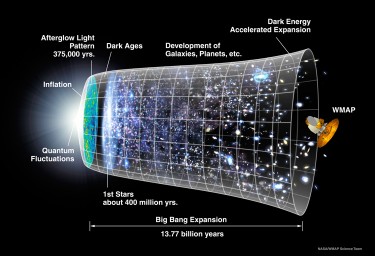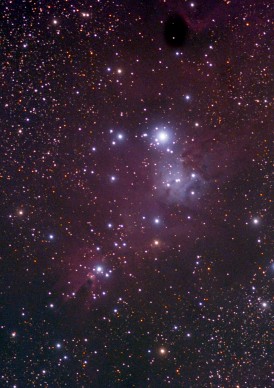 illiam James famously said “from nothing to being there is no logical bridge.“
How to build that bridge is a challenge for modern science: if the universe is not
eternal, then it must have been created from nothing, and there must be a bridge
somewhere between nothing and something. To understand where the universe came from,
we need to understand space and nothingness.
illiam James famously said “from nothing to being there is no logical bridge.“
How to build that bridge is a challenge for modern science: if the universe is not
eternal, then it must have been created from nothing, and there must be a bridge
somewhere between nothing and something. To understand where the universe came from,
we need to understand space and nothingness.
Space has a distinct advantage: at least it exists. How do you study something that doesn't even exist? How do you even think about it?
It's impossible even to conceptualize what nothingness is like. We can't say “In one instant space and time were created” because before the Big Bang there were no instants: if time did not yet exist, nothing could ever change. Our language and logic get in the way.

Evolution of the universe from the Big Bang (at left) to the present. (NASA/WMAP Science Team. Source)
Our language and our mathematics are spectacularly unsuited for describing things that don't exist. We cannot imagine a singularity, where many objects exist at the exact same point. It is a contradiction, because different objects, by definition, are at different locations. Not only do our physical theories not work with singularities, but math and logic cannot describe their properties, because math and logic are ultimately derived from the concept of number.
This is what is really meant when people say our theories break down at a singularity. It's not just that the theories don't predict the right thing; they cannot describe it at all, because though we talk about singularities, they don't actually make sense to us.
Stephen Hawking wrote that in the primordial universe time behaved as another dimension of space. This implies that at some point, a chance fluctuation changed this fourth dimension into time, which produced an unstable object that instantaneously created the universe. He wrote
Because there is a law like gravity [and quantum physics], the universe can and will create itself from nothing. Spontaneous creation is the reason there is something rather than nothing, why the universe exists, why we exist.[1]
In the early universe—when the universe was small enough to be governed by both general relativity and quantum theory—there were effectively four dimensions of space and none of time. [2]
But how could this have happened? Without time, nothing can ever change. Nothing can ever be created, including time itself. When we think of ‘quantum fluctuations’ we implicitly assume they are fluctuations over time. Thus we have an apparent contradiction.
The background problem
Some people have objected that Hawking is not really talking about creation from nothing. In his scheme spatial dimensions and mathematical and physical laws already exist. Our theories implicitly assume that there are physical laws and time on which the universe could have been created. This is called the background problem.
Of course it is not a problem for the universe, but it is one for us when we try to create a conceptual framework to understand it. The difficulty in imagining a creation event, where some big important event happens in a world where time does not exist, and thus no events can occur, and where space does not exist, and thus there is no room for it to occur, has led scientists to search for new ways to think about it.
Some postulate that the creation event was a collision between two colossal 11 (10 space + 1 time)-dimensional structures called branes. Perhaps a brane and an anti-brane (or as I prefer to call it, an anti-brane and an unkly-brane) interacted with each other by a process of reconnection, much as the magnetic lines of force reconnect on the Sun. This would have released a colossal amount of energy. Maybe time itself could even be created from such an event.

The Christmas Tree cluster came into existence as a single object when the cluster was defined to exist, even though all the components existed long before. This is not the least bit philosophically interesting.
Others postulate that the universe was created from mathematical principles or axioms alone. This presupposes that axioms have a Platonic existence of their own in the absence of a universe. Yet most people think that ideas, axioms, and mathematical relations are nothing more than concepts: ideas about the world expressed in a language. They can exist only in the mind of the thinker. To quote Hawking again:
The beginning of the universe was governed by the laws of science and doesn't need to be set in motion by some God.
If so, the idea that rules, axioms, representations, or models could become reality is ruled out because it implicitly assumes the existence of a Modeler or a Brain capable of containing representations.
Another obstacle is that no plausible mechanism has ever been proposed by which axioms, even if they could exist in a world by themselves, could create physical objects. All the laws of physics described so far deal with fields, excitations on fields (which we call particles), and dimensions that interact with each other, not with mathematical laws themselves, which are mere generalizations about how the objects behave—social constructs, if you will.
The idea that the universe is made of math is like saying that our universe can be described in words, and therefore it is made of words. The idea that reality is mathematics is seductive because math is internally consistent, but if it were true, then the potential existence of a mathematical structure, even if no one had yet invented it, would guarantee the existence of something corresponding to it. If it were possible to have a formula for unicorns, for example, it would mean that somewhere there must be a real unicorn. Otherwise, why would one bit of math create something and another not?
There is no hard line between mathematics and language: every mathematical axiom can be stated, if we allow a sufficient amount of verbosity, in language. (And, as the Internet conclusively demonstrates, the supply of verbosity in the universe is infinite.) The claim that the universe was created by mathematics has a faint sulfurous whiff of alchemy about it.
What we have here is . . . some kind of emergent phenomenon
If the background problem makes it tough to explain time, it makes it even tougher to explain space. Even if one comes up with a theory of quantized space, the question remains: how to describe space without assuming the existence of points separated by various distances—which assumes the existence of space?
If I said space was a type of energy, or some type of quantum entanglement, or some kind of causal set, or some kind of spinfoam structure, one could object that all these things are defined by particles separated by a fixed distance, and I haven't described space at all, but merely imposed a structure on it.
To understand what something is, you have to explain it in terms of something it is not. A theory of space would have to be based on something that has no size, no length, and no distance. If we just said that space started out infinitely small and then got bigger, we might be correct, but we still would not have explained what space is, because smallness is a property of things in space. Space has to be an emergent phenomenon with no background. It won't be easy to figure out what that means until we learn how to think about nothingness.
Does it matter?
Stuart B. Heinrich, in a fascinating article on Arxiv.org [3], says that, for self-aware beings, it makes no difference whether the world is real or not.
Any system with finite information content that is consistent can be formalized into an axiomatic system, for example by using one axiom to assert the truth of each independent piece of information. Thus, assuming that our reality has finite information content, there must be an axiomatic system that is isomorphic to our reality, where every true thing about reality can be proved as a theorem from the axioms of that system.
Somehow it is possible for self-awareness to be represented axiomatically, and this means that any axiomatic system that can derive self-awareness is perceived as being real (internally) without the need for an objective manifestation. Thus, there is nothing special about our reality, it is just one of an infinite number of completely disjoint mathematical spaces.
Thus, our preconceived notion of physical existence is no different from mathematical existence relative to the arbitrary set of axioms that define our reality.
In philosophical terms he's saying that mathematical proofs are necessary, while our existence is contingent. It's really the same argument as before. We might not care whether the world is real, but we would very much care if it did not exist—a different question entirely.
Maybe the world doesn't actually exist.
And that brings us to the idea that, when taken as a whole, nothing really does exist; the universe is precisely canceled out by an anti-universe, with its own antisubstance and antidimensions. For example, at the moment of creation another antiuniverse might have begun travelling backwards in time, with antidimensions of its own.
Heinrich also discussed the concept, popular these days with Silicon Valley types, that our universe is only a simulation. He recognizes that this is not really an answer, because it raises the question of how the universe in which the simulation is being run came to exist. Even if we suppose that the two universes are simulations conducted in each other, thereby creating an infinite reflection, the question of where it all came from remains.
A variation on this theme is the idea that gravity is a type of negative energy, and the total energy of gravity is exactly canceled out by the positive energy of matter. One can think of it as a bank sending you a bill for $5 and sending someone else a check for $5. The total amount of money is still zero.
Yet, as appealing as this is, we still crave an explanation of how nothingness could have been split into a something and an anti-something.
Two hundred years ago, our greatest minds grappled with the question of infinity. It may be part of the grand irony that even though we can now describe everythingness, we're now reduced to trying to understand nothingness. It seems, as far as the universe is concerned, we still don't understand nothin'.
1. Hawking S Mlodinow L (2012). The Grand Design. Bantam Books, p.80.
2. Ibid., p.134; cited in [3].
3. Heinrich SB (2012). The relativity of existence. Arxiv:1202.4545v2 [physics.hist-ph] Link
created jul 01, 2017; last edited jul 04 2017, 4:56 am

